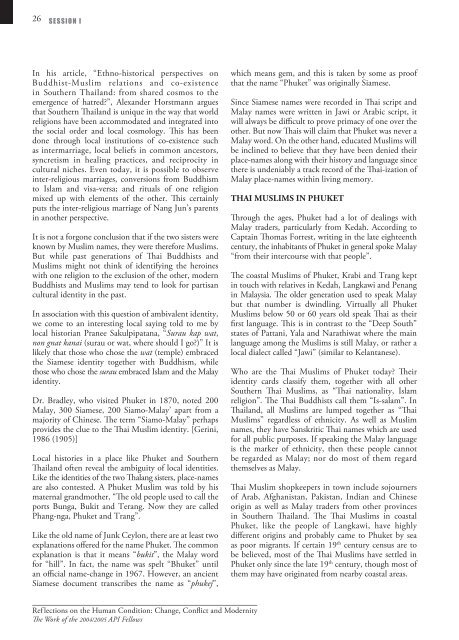Reflections on the Human Condition - Api-fellowships.org
Reflections on the Human Condition - Api-fellowships.org
Reflections on the Human Condition - Api-fellowships.org
Create successful ePaper yourself
Turn your PDF publications into a flip-book with our unique Google optimized e-Paper software.
26<br />
SESSION I<br />
In his article, “Ethno-historical perspectives <strong>on</strong><br />
Buddhist-Muslim relati<strong>on</strong>s and co-existence<br />
in Sou<strong>the</strong>rn Thailand: from shared cosmos to <strong>the</strong><br />
emergence of hatred?”, Alexander Horstmann argues<br />
that Sou<strong>the</strong>rn Thailand is unique in <strong>the</strong> way that world<br />
religi<strong>on</strong>s have been accommodated and integrated into<br />
<strong>the</strong> social order and local cosmology. This has been<br />
d<strong>on</strong>e through local instituti<strong>on</strong>s of co-existence such<br />
as intermarriage, local beliefs in comm<strong>on</strong> ancestors,<br />
syncretism in healing practices, and reciprocity in<br />
cultural niches. Even today, it is possible to observe<br />
inter-religious marriages, c<strong>on</strong>versi<strong>on</strong>s from Buddhism<br />
to Islam and visa-versa; and rituals of <strong>on</strong>e religi<strong>on</strong><br />
mixed up with elements of <strong>the</strong> o<strong>the</strong>r. This certainly<br />
puts <strong>the</strong> inter-religious marriage of Nang Jun’s parents<br />
in ano<strong>the</strong>r perspective.<br />
It is not a f<strong>org</strong><strong>on</strong>e c<strong>on</strong>clusi<strong>on</strong> that if <strong>the</strong> two sisters were<br />
known by Muslim names, <strong>the</strong>y were <strong>the</strong>refore Muslims.<br />
But while past generati<strong>on</strong>s of Thai Buddhists and<br />
Muslims might not think of identifying <strong>the</strong> heroines<br />
with <strong>on</strong>e religi<strong>on</strong> to <strong>the</strong> exclusi<strong>on</strong> of <strong>the</strong> o<strong>the</strong>r, modern<br />
Buddhists and Muslims may tend to look for partisan<br />
cultural identity in <strong>the</strong> past.<br />
In associati<strong>on</strong> with this questi<strong>on</strong> of ambivalent identity,<br />
we come to an interesting local saying told to me by<br />
local historian Pranee Sakulpipatana, “Surau kap wat,<br />
n<strong>on</strong> gnat kanai (surau or wat, where should I go?)” It is<br />
likely that those who chose <strong>the</strong> wat (temple) embraced<br />
<strong>the</strong> Siamese identity toge<strong>the</strong>r with Buddhism, while<br />
those who chose <strong>the</strong> surau embraced Islam and <strong>the</strong> Malay<br />
identity.<br />
Dr. Bradley, who visited Phuket in 1870, noted 200<br />
Malay, 300 Siamese, 200 Siamo-Malay’ apart from a<br />
majority of Chinese. The term “Siamo-Malay” perhaps<br />
provides <strong>the</strong> clue to <strong>the</strong> Thai Muslim identity. [Gerini,<br />
1986 (1905)]<br />
Local histories in a place like Phuket and Sou<strong>the</strong>rn<br />
Thailand often reveal <strong>the</strong> ambiguity of local identities.<br />
Like <strong>the</strong> identities of <strong>the</strong> two Thalang sisters, place-names<br />
are also c<strong>on</strong>tested. A Phuket Muslim was told by his<br />
maternal grandmo<strong>the</strong>r, “The old people used to call <strong>the</strong><br />
ports Bunga, Bukit and Terang. Now <strong>the</strong>y are called<br />
Phang-nga, Phuket and Trang”.<br />
Like <strong>the</strong> old name of Junk Ceyl<strong>on</strong>, <strong>the</strong>re are at least two<br />
explanati<strong>on</strong>s offered for <strong>the</strong> name Phuket. The comm<strong>on</strong><br />
explanati<strong>on</strong> is that it means “bukit”, <strong>the</strong> Malay word<br />
for “hill”. In fact, <strong>the</strong> name was spelt “Bhuket” until<br />
an official name-change in 1967. However, an ancient<br />
Siamese document transcribes <strong>the</strong> name as “phukej”,<br />
Ref lecti<strong>on</strong>s <strong>on</strong> <strong>the</strong> <strong>Human</strong> C<strong>on</strong>diti<strong>on</strong>: Change, C<strong>on</strong>flict and Modernity<br />
The Work of <strong>the</strong> 2004/2005 API Fellows<br />
which means gem, and this is taken by some as proof<br />
that <strong>the</strong> name “Phuket” was originally Siamese.<br />
Since Siamese names were recorded in Thai script and<br />
Malay names were written in Jawi or Arabic script, it<br />
will always be difficult to prove primacy of <strong>on</strong>e over <strong>the</strong><br />
o<strong>the</strong>r. But now Thais will claim that Phuket was never a<br />
Malay word. On <strong>the</strong> o<strong>the</strong>r hand, educated Muslims will<br />
be inclined to believe that <strong>the</strong>y have been denied <strong>the</strong>ir<br />
place-names al<strong>on</strong>g with <strong>the</strong>ir history and language since<br />
<strong>the</strong>re is undeniably a track record of <strong>the</strong> Thai-izati<strong>on</strong> of<br />
Malay place-names within living memory.<br />
THAI MUSLIMS IN PHUKET<br />
Through <strong>the</strong> ages, Phuket had a lot of dealings with<br />
Malay traders, particularly from Kedah. According to<br />
Captain Thomas Forrest, writing in <strong>the</strong> late eighteenth<br />
century, <strong>the</strong> inhabitants of Phuket in general spoke Malay<br />
“from <strong>the</strong>ir intercourse with that people”.<br />
The coastal Muslims of Phuket, Krabi and Trang kept<br />
in touch with relatives in Kedah, Langkawi and Penang<br />
in Malaysia. The older generati<strong>on</strong> used to speak Malay<br />
but that number is dwindling. Virtually all Phuket<br />
Muslims below 50 or 60 years old speak Thai as <strong>the</strong>ir<br />
first language. This is in c<strong>on</strong>trast to <strong>the</strong> “Deep South”<br />
states of Pattani, Yala and Narathiwat where <strong>the</strong> main<br />
language am<strong>on</strong>g <strong>the</strong> Muslims is still Malay, or ra<strong>the</strong>r a<br />
local dialect called “Jawi” (similar to Kelantanese).<br />
Who are <strong>the</strong> Thai Muslims of Phuket today? Their<br />
identity cards classify <strong>the</strong>m, toge<strong>the</strong>r with all o<strong>the</strong>r<br />
Sou<strong>the</strong>rn Thai Muslims, as “Thai nati<strong>on</strong>ality, Islam<br />
religi<strong>on</strong>”. The Thai Buddhists call <strong>the</strong>m “Is-salam”. In<br />
Thailand, all Muslims are lumped toge<strong>the</strong>r as “Thai<br />
Muslims” regardless of ethnicity. As well as Muslim<br />
names, <strong>the</strong>y have Sanskritic Thai names which are used<br />
for all public purposes. If speaking <strong>the</strong> Malay language<br />
is <strong>the</strong> marker of ethnicity, <strong>the</strong>n <strong>the</strong>se people cannot<br />
be regarded as Malay; nor do most of <strong>the</strong>m regard<br />
<strong>the</strong>mselves as Malay.<br />
Thai Muslim shopkeepers in town include sojourners<br />
of Arab, Afghanistan, Pakistan, Indian and Chinese<br />
origin as well as Malay traders from o<strong>the</strong>r provinces<br />
in Sou<strong>the</strong>rn Thailand. The Thai Muslims in coastal<br />
Phuket, like <strong>the</strong> people of Langkawi, have highly<br />
different origins and probably came to Phuket by sea<br />
as poor migrants. If certain 19 th century census are to<br />
be believed, most of <strong>the</strong> Thai Muslims have settled in<br />
Phuket <strong>on</strong>ly since <strong>the</strong> late 19 th century, though most of<br />
<strong>the</strong>m may have originated from nearby coastal areas.

















